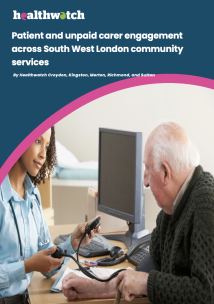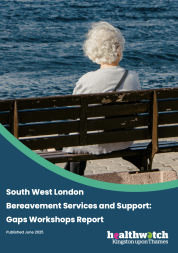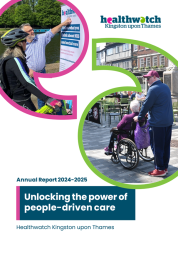Patient and unpaid carer engagement across south west London community services

Download the report
Background
The South West London Integrated Care Board commissioned the six independent Healthwatch organisations in Croydon, Kingston, Merton, Richmond, Sutton, and Wandsworth to gather feedback from service users and their unpaid carers across a variety of adult and paediatric community services.
This report presents key insights drawn from 527 responses in six boroughs, capturing experiences from a diverse range of communities and services.
Across boroughs, patients and unpaid carers valued the generally excellent staff and professionalism and most patients and unpaid carers felt that they had received high-quality, compassionate care. Most participants also said that the services - once they had progressed past often long waits for initial care - were timely and responsive.
In addition, we identified eight areas around which patients and unpaid carers commonly raised concerns. Some services were better at addressing these than others, offering opportunities for collaborative learning.
South West London Healthwatch Recommendations
Based on patient and unpaid carer feedback, we have drawn out specific opportunities for improvement to support the South West London ICB in elevating patient and unpaid carer experiences by enhancing overall care, reducing between-borough disparities, and addressing health inequalities.
We asked the South West London ICB to consider how they can help community services address these concerns and provide oversight to ensure improvement.
- Patients and unpaid carers accessing more than one community service told us that interservice communication and coordination were often inconsistent.
- Patients and unpaid carers raised concerns about continuity of care, specifically about having constantly changing providers and needing to repeat their needs.
- Patients and unpaid carers need support (in both digital and non-digital formats) accessing information that can help them navigate health and care pathways, access medication and equipment, and find unpaid carer training, financial guidance, and respite support.
- Unpaid carers said that comprehensive end of life planning discussions are not always offered, even where the death of a loved one is anticipated, and would like services to consistently invite such conversations when appropriate.
- Concerns were raised that staff were not meeting the communication needs of patients with disabilities, particularly for people who are hard of hearing, making it difficult for them to understand information about their health and care.
- A notable minority said that they did not receive culturally-competent care, suggesting a need for improved staff training in this area.
- Patients and unpaid carers would like clearer and more specific discharge information, both for themselves and service providers.
- Some community nursing patients, particularly those that are housebound, commented that they struggle to receive timely prescriptions and medications.

